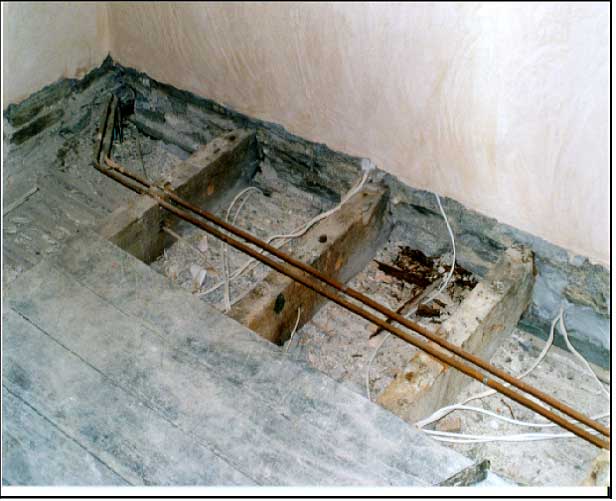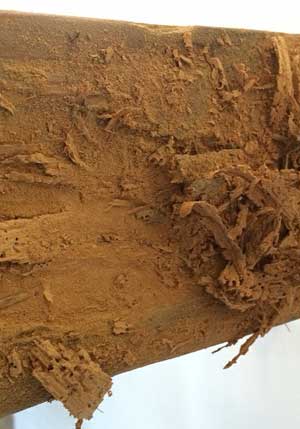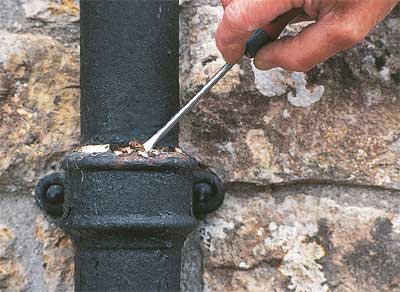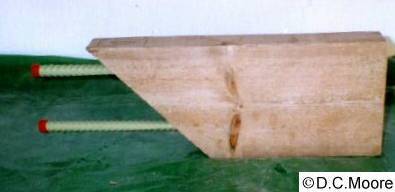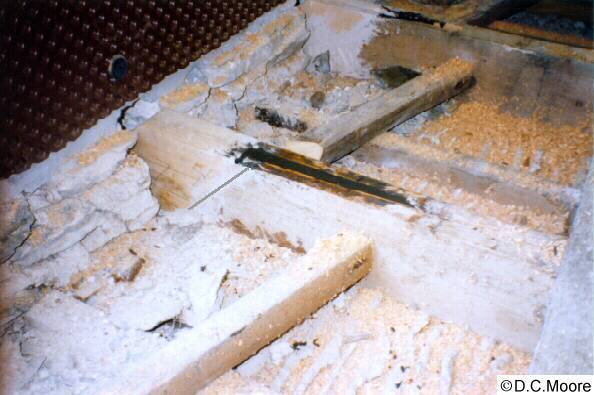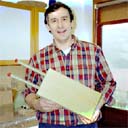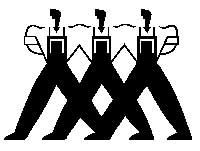How to repair timber Joists
This project is presented by Property Repair Systems. We show you how to make Structural repairs to Joists inside buildings without removing either a ceiling or a floor, from above, below or from one side.
Definition of a Joist
"spanning timbers that jointly support a floor." (Definitions may vary regionally, as may the spelling)
Joists share the load of a floor and standard calculations cover Domestic Loadings - see TRADA Tables.
First Floor Joists in a Party Wall - rotted ends embedded,
Lath and Plaster ceiling in place.
Common Location in Buildings
Floors at all levels - spanning across the rooms in either direction.
Decay causes
Outside walls - raised ground levels, blocked or damaged gutters and downpipes, blocked air bricks, water leaks.
Inside walls - lack of ventilation, sub site soil touching the joists, condensation, water leaks
Wet rot and insect attack then destroy the bearing ends.
Dry Rot in Joists sitting on a timber Wall Plate
Insect damage in a Joist
Other Factors often seen on Survey
Party Wall - sharing guttering and downpipes, differing
internal ground levels, water leaks.
Cast iron downpipes crack and corrode
Information required from Survey of Joists
Access for Repair - usually from the top, but may be considered from beneath (hardest physically for the Technician), or from the side.
Note - check the two neighboring properties for similar decay. Compression during rotting often causes timber floors to sag or bounce. Look for rot in the skirting boards - shrinkage or bowing..
Size - width, depth, length, bearing support length
Number - they may vary in size
Timber type - softwood (Pine) or hardwood (Oak), not known
Decay type - wet rot, insect attack (CFB, DWB or Longhorn), Dry rot
Amount to cut off - drill test holes if possible, or tap with a hammer
Final appearance required - visible but painted, decorative natural finish, hidden
Handed - a sketch is useful, with dimensions
Repair Options for Joists
Repair Types - solid resin or Timber Resin Splice (TRS)
Most popular access Types - top slot, side slot, bottom slot
TRS Types - Top Slot = Type C, Side Slot = Type D, Bottom Slot = Inverted Type C
Special situation - above a valuable ceiling - often made of lath and plaster - consider a Type C45 - it has a 45 degree face angle.
.Example of a 45 degree face angle Timber Resin Splice - TYPE C45
45 degree faced TRS in place with resin having been poured - note that the ceiling has not been disturbed.
Photo Gallery for Bressumer Repairs by TRS Type
Type A - Solid Epoxy Resin - removable shuttering - drilling up the end grain of the Parent timber on Site
Type B - Solid Epoxy Resin - permanent shuttering - drilling up the end grain of the Parent Timber on Site
Type C - Timber Resin Splice supplied with fitted bars - Top Slot(s) in the Parent timber.
Type C45 - Timber Resin Splice supplied with fitted bars - 45 degree face angle, Top Slot(s) in the Parent timber
Type D - Timber Resin Splice supplied with fitted bars - Side Slot(s) in the Parent timber
Type E - Timber Resin Splice supplied with Top Slot(s) - drill holes up the end grain of the Parent timber.
Type F - Timber Resin Splice supplied with Side Slot(s) - drill holes up the end grain of the Parent timber.
Type G - Timber Resin Splice supplied with Top Slot(s) - cut Top Slot(s) in the Parent timber.
Type H - Timber Resin Splice supplied with Side Slot(s) - cut Side Slot(s) in the Parent timber.
Heritage Considerations for repairing Joists
Repair Type - a Conservation Officer will generally prefer a Timber Resin Splice over a Solid Resin Repair
TRS Type - a Conservation Officer will generally prefer least damage to the parent timber, so TRS Types E (Top Slot) and F (Side Slot) may be offered, in which the slots are created during Manufacture in the new timber and the Technician drills holes up the end grain of the Parent. This is only feasible if the cut off length is at least 600mm.
TRS Type E Steps - Technician has to drill up the end grain, so needs good clearance to the wall.
More unusual Timber Resin Repair types
Mouldings - sometimes found on the visible decorative faces or edges of exposed Joists
Structural Calculations for Repairing Joists
Free of charge - our Design and a Check Calculation - not Insurance Indemnified - we are not Structural Engineers - same day service
Chargeable - independent Structural Engineer - ask for one of our Forms - Indemnified by a Qualified Structural Engineer - allow at least 5 working days.
Bressumer Structural Data Collection Form - click here for the Form used when we submit your Beam Repair to a Structural engineer.
Epoxy Resins for Repairing Joists
To buy resins - visit our Resins Shop
Sealing beam end face to a TRS or to seal Shutter Boxes - Quick Setting Wood Filler
Pouring into Shutter Boxes (Type A or Type B) and Top Slots (Type C, E) - Structural Epoxy Pouring Grout
Injecting into Side Slots (Type D and Type F) - Structural Epoxy Pouring Grout plus 1 litre Cartridges and Skeleton Gun
Bonding Bars into timbers on site - for Solid Resin Repairs, Type A and Type B and TRS Timber Kits Type E and Type F - Thixotropic Epoxy Injection Resin plus 400cc Cartridge Kits and Skeleton Gun, with extension tubes for the Cartridges.
Bars used for Repairing Joists
Bars fitted to TRS Units - Zinc Plated High Tensile Grade 8.8 Steel Allthread
Couplers - available for joining threaded bars in some applications
Bars fitted on Site - either Zinc Plated High Tensile Grade 8.8 Steel Allthread or Epoxy-Glass Bar
Types of Wood used for Timber Resin Splice Joist Repair Kits
Standard Kiln Dried Softwood (Pine) - white or Redwood Pines, Strength Graded C24
Non standard Kiln Dried Softwood (Southern Yellow Pine, Douglas Fir) - yellow or red striped Pines, Strength Graded C24
Non standard Kiln Dried Hardwood (Oak) - English or American Oaks, not Strength Graded
Non standard Air Dried Hardwood (Oak) - English Oak, will contain insect holes, shakes and splits, will not be dimensionally stable, may shrink, twist and split further in service.
Special Tools for Repairing Joists - we hire these tools
Cutting Slots - Low Speed, High Torque , reversible electric drilling machine (minimum power - 1000 watts), in conjunction with fully fluted wood Augers
Drilling Holes up the ends of joists - Low Speed, High Torque , reversible electric drilling machine (minimum power - 1000 watts), in conjunction with fully fluted wood Augers
Injecting into Side Slots (Type D and Type F) - 1 litre Skeleton Gun
Bonding Bars into timbers on site - for Solid Resin Repairs, Type A and Type B and TRS Timber Kits Type E and Type F - 400cc Skeleton Gun
Manufacturing Time for Timber Resin Splice Joist Repair Kits - minimum
Made in standard Kiln Dried Softwood (Pine) - 3 working days, plus 2 working days for delivery
Made in non standard Kiln Dried Softwood (Southern Yellow Pine, Douglas Fir) - 5 working days, plus 2 working days for delivery
Made in non standard Kiln Dried Hardwood (Oak) - 7 working days, plus 2 working days for delivery
Made in non standard Air Dried Hardwood (Oak) - 21 working days, plus 2 working days for delivery
Elm is also available to Special Order - expensive.
Drawings of installation steps for Timber Resin Splice Joist Repair Kits
Type A - Solid Epoxy Resin - removable shuttering - drilling up the end grain of the Parent timber on Site
Type B - Solid Epoxy Resin - permanent shuttering - drilling up the end grain of the Parent Timber on Site
Type C - Timber Resin Splice supplied with fitted bars - Top Slot(s) in the Parent timber.
Type D - Timber Resin Splice supplied with fitted bars - Side Slot(s) in the Parent timber
Type E - Timber Resin Splice supplied with Top Slot(s) - drill holes up the end grain of the Parent timber.
Type F - Timber Resin Splice supplied with Side Slot(s) - drill holes up the end grain of the Parent timber.
Type G - Timber Resin Splice supplied with Top Slot(s) - cut Top Slot(s) in the Parent timber.
Type H - Timber Resin Splice supplied with Side Slot(s) - cut Side Slot(s) in the Parent timber.
Method Statements for Timber Resin Splice Joist Repair Kits
Type A - Solid Epoxy Resin - removable shuttering - drilling up the end grain of the Parent timber on Site
Type B - Solid Epoxy Resin - permanent shuttering - drilling up the end grain of the Parent Timber on Site
Type A and B Modified - Solid Epoxy Resin - side slots in the Parent Timber due to lack of cutoff space to end drill
Type C - Timber Resin Splice supplied with fitted bars - Top Slot(s) in the Parent timber.
Type D - Timber Resin Splice supplied with fitted bars - Side Slot(s) in the Parent timber
Type E - Timber Resin Splice supplied with Top Slot(s) - drill holes up the end grain of the Parent timber.
Type F - Timber Resin Splice supplied with Side Slot(s) - drill holes up the end grain of the Parent timber.
Type G - Timber Resin Splice supplied with Top Slot(s) - cut Top Slot(s) in the Parent timber.
Type H - Timber Resin Splice supplied with Side Slot(s) - cut Side Slot(s) in the Parent timber.
Download Data Sheets and Safety Data Sheets for Resins
Structural Epoxy Pouring Resin and Grout - for pouring into slots and into cartridge tubes for injection - Data Sheet - Safety Data - Activator
Safety Data - Base - Safety Data - Powder
Thixotropic Epoxy Injection Resin - for injecting holes using 400cc cartridge tubes - Data Sheet - Safety Data Sheet Activator - Safety Data Sheet Base
Mouldable Epoxy Putty - for filling defects - Data Sheet - Safety Data Sheet
Where to find more reading and photographs of Timber Resin Repairs
www.timber-repair.co.uk - how to repair timber joists
Timber Repair Review 1 - Timber Repair Review 2 - call us for the printed versions - 01626 872886
TRADA Eurocode - resin repair technical report by the Timber Research and Development Association
www.joist-repair.co.uk - how to quickly repair joists and beams of any size
Timber Decay Links for photographs of rots and insect damage
www.dryrot.biz - how to kill Dry Rot in buildings
www.woodworm-info.co.uk - how to kill and prevent woodworm and death watch beetle
www.woodworm-expert-advice-forum.org.uk - all your questions and our answers about woodworm damage and treatment
Technical Help for repairing Joists
Property Repair Systems expert staff can help you with all kinds of timber repairs and are more than happy to give further information and advice.
Call 01626 872886 or E: Mail us help@propertyrepairsystems.co.uk
Timber Beam Repairs | Contact | About Us | About the Author | Index Page
Property Repair Systems
T: 01626 872886
E: Mail us help@propertyrepairsystems.co.uk
Site written by: David Moore
David Moore, B.A. (Hons.), C.T.I.S., C.R.D.S. Technical Author
Google+
Other Property Repair Systems Sites:
www.boron.org.uk - how to use Boron based insecticides/fungicides to treat timber rots and insect attack
www.dampness-info.co.uk - how to treat penetrating dampness in walls and plaster
www.deck-treatment.co.uk - how to treat patio decks and yacht decks
www.dryrot.biz - how to kill Dry Rot in buildings
www.drywallandfloor.co.uk - membranes for lining damp walls, floors, basements and cellars
www.fire-door-paint.co.uk - upgrade doors to 30 minutes fire resistance
www.joist-repair.co.uk - how to quickly repair joists and beams of any size
www.propertyrepairsystems.co.uk - our Home Site
www.steel-fire-paint.co.uk - treat steel with Intumescent Paint to provide fire protection
www.timber-repair.co.uk - how to repair timber beams
www.woodworm-info.co.uk - how to kill and prevent woodworm and death watch beetle
www.woodworm-expert-advice-forum.org.uk - all your questions and our answers about woodworm treatment DIY
